The Grand Alliance Read online
Page 3
He leaned back in his seat, struggling a little against the g forces bearing down as he fired his engines at maximum thrust. Part of him wanted to change course, to fly over to his most vulnerable ships and run the gauntlet with them. But that would serve no purpose…and it was an option his duty denied him. He was one of maybe three pilots in the fleet who could organize and lead the strike force, and everybody else save those experienced pilots was expendable. It was a gruesome reality and one that made him feel like shit about himself, but it was true, nevertheless.
Nothing was more important than winning the war.
Nothing…and no one.
* * *
“The damage assessments are in, Captain. Nine supply vessels destroyed outright, twelve severely damaged, and likely crippled. The AI projects a seventy to ninety percent loss rate on the cargoes on the most heavily damaged vessels.”
Eaton just nodded. Tarleton’s report was complete and accurate, as always…but just then, she was more concerned about her fighter squadrons than the tonnage of Hegemony shipping they’d taken out. She knew that was short-sighted, that the only way to win the war—to avoid otherwise inevitable defeat—was to strangle the enemy’s logistics, but sending out hordes of unprepared pilots again and again was wearing her down. She told herself it was war. It was her duty. She knew that was true.
But it didn’t feel that way. It felt like murder.
She turned toward Tarleton’s station to speak, but she remained silent. There was nothing to do, no orders she could give to aid her returning pilots. If she’d led battleships, she would have ordered them forward, closed with the Hegemony escorts and given those vessels something to worry about besides hunting down her fighters. Indeed, she had almost issued the command anyway. But her escort carriers were almost laughably weak in battle, what passed for armor just paper-thin steel hulls, their hardpoints devoid of weaponry entirely, save for half a dozen or fewer short-ranged point defense turrets. Her eight escorts were all light frigates, themselves no match for the enemy counterparts, and much less the handful of cruisers out there. All she could do by advancing was get her fleet destroyed…and her orders in that regard were clear.
Bombers were expendable, but her carriers were not. They were junk, mostly ancient freighters hastily repurposed in the shipyards of Craydon and the other Iron Belt worlds, but they carried bombers, and in war, especially a war against the Hegemony, that made them indispensable. The directives she’d received—from none other than Tyler Barron himself—were distressingly clear and detailed. Not only was she to keep her carriers out of range of enemy warships at all times, she was to flee the instant any enemy forces threatened them. Even if it meant abandoning every single bomber.
She turned toward the kill figures, partly to analyze the success of the attack, and partly to distract herself from watching her green pilots struggling to make it back. The strike had gone well, and one look at the size of the supply ships gave her a good idea of the sheer volume of war materiel her people had destroyed. It was inconceivable in terms of the factory output and hours of labor it represented…but it was also less than twenty percent of what the convoy carried. It would hurt the enemy, but they would still get eighty percent of the supplies, and they would come that much closer to turning Megara into an impregnable fortress in the center of the Confederation, a logistical center that could support their continuing war efforts.
Even as she winced at the losses her squadrons had taken, she considered launching a second strike. She was no expert on the logistics of war, but she knew twenty percent wasn’t enough, that the struggle against the enemy supply lines had to do better than that. Her pilots would be exhausted on a second attack, their bombers hastily refit instead of carefully prepped as they had been for the first strike. But she would have done it anyway…if there had been time. Time before the enemy escorts could close with her carriers.
Her authority allowed her to play with the lives of her pilots, but not with the hulls that carried them. She would have just enough time as it was to land her survivors, and then her fleet had to bug out. Allowing the convoy to escape without further damage was bad enough, but losing the ships that allowed future strikes would be disastrous.
“Alright everybody…” She turned and looked around Tarsus’s cramped bridge. “…a successful strike all around.” She felt guilty for declaring the mission a success while her pilots were still out there dying, but she’d learned enough about command to understand how crucial morale was, for all of her people. “The enemy will feel the loss of those supplies.” Not enough, though. “Now, let’s get our squadrons back onboard. I want all engine crews ready. We’re blasting off at full thrust as soon as the last fighter is back in the bays.
And, maybe sooner…especially if any of these rookies lag too badly.
The idea of leaving even one of her pilots behind sickened her, but she had her orders. And, she understood the costs war demanded, and the immense price that would be extracted if there was any chance of victory.
* * *
Stanton Hayes sat down hard in the chair. He was exhausted from the mission, sore from hours spent in his Lightning’s cramped cockpit—and the g forces from Tarsus’s prolonged acceleration weren’t helping any of it. The converted freighter wasn’t what anyone would call a fast ship, but she also lacked the modern dampeners that offset the crushing force of acceleration in proper warships.
He wanted to lay down on his bunk, to close his eyes and sleep. But he couldn’t. He had a job to do first, and it was one he’d never believed could wait. He felt himself dying a bit more with each mission, at least the part of him that was good for anything but war. Little remained to him that meant anything, save duty, and he took that very seriously. He lived to lead his pilots, to be there for them, in battle, and in between engagements, to hold up their morale, to bolster their courage. And to do what he could for them when they were gone.
He tapped at the keyboard of the small workstation on his desk, but his mind was still on the final moments of the mission. He’d watched from his cockpit in frozen horror as the fleet’s carriers engaged their thrusters while a third of his bombers were still coming in. He understood, of course, that the safety of the carriers came first. It was something even his half-trained pilots had heard many times in the Academy. Fighters were expendable. Warships were not.
Still, horror scenes had whipped through his head in those terrible moments, images of several dozen of his people left behind, and despite all he knew about doctrine and about the realities of the war, he’d felt a surge of anger and resentment…and he’d deliberately ignored the orders to land, declaring he would come in only when the last of his people had. It had been a foolish display, one that hadn’t made a bit of difference to any of his lagging pilots, struggling to reach their base ships in time. And one that could have had severe consequences under a commander less restrained than Captain Eaton. But he’d done it…and he knew he would do it again.
And she had looked the other way, as he suspected she would do again if need be.
He leaned back and sighed, moving his hand back through his hair and then massaging his temples. His head throbbed, though he couldn’t guess what combination of fatigue, stress, and g forces was responsible.
But he had work to do, work that couldn’t wait.
He began tapping on the keyboard, bringing up a blank screen. Then he paused, staring at it, his mind momentarily blank. He’d faced the enemy, endured the terror and stress of battle again and again…but this was the thing he hated most. The task he feared the most.
He shook off the malaise and the fear, and he forced himself to focus. Then he began typing.
‘It is with the greatest regret I must inform you that your son, Ensign Douglas Velet, was killed in action fighting against a Hegemony fleet. Doug was a brave pilot and he was beloved and respected by his colleagues…”
Chapter Four
Orbital Platform Killian
Planet Cray
don, Calvus System
Year 320 AC
“Any improvement, Doctor?” Tyler Barron stood in the hallway of the naval hospital, a sprawling facility that occupied almost a third of Craydon’s largest orbital station. There were hundreds of beds, as well as operating theaters, critical care wards, and the like. Mercifully, the vast infirmary was quiet, almost eerily so. A year before, it had been a virtual ruin, blasted almost to bits in the desperate fight to hold Craydon, but still, its beds, corridors, even its gritty, debris covered floors had been full of the wounded and the dying.
The images remained vivid in Barron’s thoughts.
“I’m sorry, sir, but as I told you, Admiral Nguyen suffered a massive stroke. We managed to save his life—barely—but the damage is quite extensive. We can repair much of it with microsurgery, but it will require repeated procedures, and even if everything goes perfectly, he will never recover all of his capabilities. We may manage to restore some quality of life to him for whatever time he has left, but I can say with absolute certainty, he will never again command the fleet…or return to duty in any capacity, save perhaps a purely ceremonial one.”
Barron felt the words like a punch to his gut, though he’d heard them before, and they only matched what he already knew. He wasn’t the kind to hide from reality, but the loss of Nguyen inflicted far more on him than pain and sympathy for a friend’s ills. It stripped away his last line of defense, the final veneer that had allowed him to at least pretend the overall fleet command wasn’t his.
There was no place to hide. Every spacer in the fleet, every man and woman fighting, crawling through the guts of a warship, sweating and struggling at their posts in battle, would look to him now. The shade of his grandfather had never weighed more heavily on him, and despite his experience, and the seemingly endless string of battles he’d fought over the past dozen years, he’d never felt so utterly unready for anything as he did just then.
Did you feel this way, Grandfather? Is it like this for all men in times like these? Or am I truly not ready?
“Do what you can for him, Doctor.” It was a foolish thing to say, or at least unnecessary. But it was all that came to his mind.
Barron turned and walked down the corridor. He’d intended to visit Nguyen as well as check up on his condition, but he knew the admiral was still in a coma…and he just didn’t have it in him to look down at the officer, one who’d once been so strong and vital, even at his advanced age. The war had surrounded Barron with death and suffering, but even he had his limits.
“Tyler…any change?” Clint Winters turned the corner just up ahead, and he walked toward Barron.
“I’m afraid not. Unless the doctor—doctors—are all wrong, at the very least, the admiral’s career is over.” A pause, and an expression that displayed both Barron’s pain and his tension. “It’s on us now, Clint.”
Winters nodded, and then he managed a thin smile. “It’s on you, Tyler. We both know it’s got to be you. You’re senior…and you’re a man every spacer wearing the uniform would be proud to follow. Myself included.”
Barron managed a jerky nod, but it took him perhaps half a minute to manage his response. His mind raced, trying to think of a way out, of some argument he could make. But he knew Winters was right, and his colleague’s clear willingness to accept the second position had sealed his fate. One of them had to be senior. The fleet could only have one top leader.
And that was him.
More than that, he faced perhaps the greatest challenge his people had endured, one even more desperate than that his grandfather had tackled. The parallels were almost eerie, and part of him wanted to shed his uniform and take off to some remote planet, never to be heard from again. But he knew that was impossible. He was a Barron…and, by God, he would behave like one.
“Your support means a lot to me, Clint. You could make a credible claim to the top job, too.” At least part of Barron wished his friend had done just that. But he knew it would never happen.
“You’re up to it, Tyler. I don’t have any doubt. I’ll be proud t follow you wherever you lead, and I think every spacer in the fleet will do the same. None of us expected this war, but if we’ve got to fight it, we’re damned lucky to have you to lead us.”
Barron pushed back against the emotion, struggling to maintain his cool demeanor. “You were coming here for a reason, I’ll bet. Right?” Barron had suddenly realized Winters had been on duty. He wasn’t at the hospital to visit Nguyen…and that meant he’d come to find Barron. Something was up. And probably that something was bad.
Winters frowned. “Yes, that’s true, Tyler.” A pause. “There’s been another accident. Orbital facility G-9, the engine parts plant.”
“Bad?” Barron already knew the answer. Winters expression was like a book.
“Really bad. They’re still not sure what happened, but a series of explosions ripped through the facility, and part of the hull was blown out. The latest count is seventy-four dead, but that’s likely to rise. The plant is completely shut down right now, and it will be at least two weeks before even partial operation can be restored.”
Barron shook his head, but he didn’t speak. What was there to say?
“There’s no way to be sure it had anything to do with the expedited production schedule.”
Barron looked over at his friend. “We can keep telling ourselves that, Clint, if it makes you feel better.” The last two months had seen a series of industrial accidents, both on the surface and among the orbital production facilities. Every militarily useful factory and plant was working at breakneck speed, as they were on all the other worlds of the Iron Belt. The fight to save Craydon had been a costly one, very costly indeed, and Barron and his comrades had pulled out all the stops, driving the industrial princes of the Iron Belt, and by extension, their millions of sweating workers, almost at the point of a bayonet. Barron hadn’t actually threatened any of them, not yet at least, but he’d done nothing to calm fears their minds created about reprisals for any failures to comply with his increasingly lofty demands for ships and materiel.
The two men stood silently for a moment, and then Barron continued. “Have you checked out the data on industrial fatalities and injuries prior to our arrival here? Craydon was no model of responsible workplace procedures, mind you, but we’ve killed over ten times the previous average…and that doesn’t include the thousands who’ve been injured.”
“That’s not a fair comparison, Tyler. We’ve tripled production over the last year. That was bound to cause an increase in accidents.”
“We tripled production, but we didn’t add factories, at least not that many. There just wasn’t time. We’ve increased output by driving everyone—industrial barons, plant managers, workers—to the brink. We killed a lot of those workers, Clint. You know we did.”
“And how many spacers have died fighting the Hegemony?”
Barron just nodded. Winters’s logic was flawless. The Confederation was fighting for its life, and the thousands upon thousands who’d died fighting the remorseless Hegemony onslaught were no less dead than a factory worked incinerated in a plant explosion. But Barron had been raised from birth to serve in the navy, and duty was always paramount to his sense of place. The navy—and the Marines and other military—were there to protect the civilians. It was a failure on their part to allow the factory workers to end up effectively on the front lines, at least from his point of view.
Finally, he turned toward his comrade—he’d found a true compatriot in the admiral, and a man he was happy to induct into his tightknit band of true friends. “Assuming we can sustain a cold-blooded view of things, that nothing is more important than victory…” Barron hated that idea—but through the guilt and doubts, it was how he felt. Absolutely. “…let’s consider a more practical issue. There’s already unrest brewing, on Craydon certainly, and on some of the other worlds, too, and it looks ever worse if you read between the lines on the reports. What do we do when there are riots? Clear th
e streets with fire? How about when the civilians decide the war, the sacrifices, are too much to endure, that freedom isn’t worth so much blood?” It was an idea that was anathema to Barron, but he also knew people had a history of undervaluing things like liberty, of trading them away for safety or protection, and sometimes only for empty promises of such.
“We do what we have to do to keep the fight going.” Winters’s voice was stone cold, and it left no doubt in Barron’s mind where his compatriot would stand if they had to make difficult choices. Shooting down mobs, arresting politicians? They seemed unlikely tactics to preserve freedom, and yet, yielding to the enemy, becoming slaves to the Hegemony…would any fate be worse than that?
“Maybe we should cut back on production levels, just a bit? If we ease off on the…”
“Tyler, you were there with me, in every one of those battles. We’ve got raiding forces out there, flying around in those tin cans we call escort carriers. It’ll be a miracle if half of them don’t suffer critical failures without taking a hit from the enemy. We’re sending little baby pilots at Hegemony shipping, so wet behind the ears, I doubt half of them know which end of a Lightning to point at the enemy. And, despite all of that, we know vast amounts of enemy supplies are still getting through. Even the spotty intelligence we’re getting from Megara is clear on one thing. The Hegemony is fortifying the system. If we give them another two or three years, we’ll never take it back, not with a thousand battleships. No, we can’t slow down…not on anything. We can’t wait. We’ve talked mostly about holding the line at Craydon and the rest of the Iron Belt, but you know as well as I do the giant question we’ve avoided talking about.”

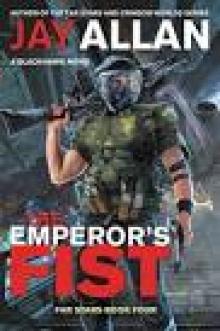 The Emperor's Fist
The Emperor's Fist Blood on the Stars Collection 1
Blood on the Stars Collection 1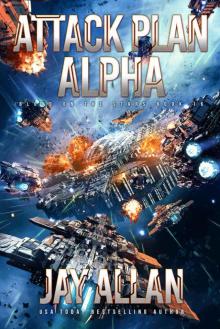 Attack Plan Alpha (Blood on the Stars Book 16)
Attack Plan Alpha (Blood on the Stars Book 16) BOB's Bar (Tales From The Multiverse Book 2)
BOB's Bar (Tales From The Multiverse Book 2) The Others
The Others Nightfall
Nightfall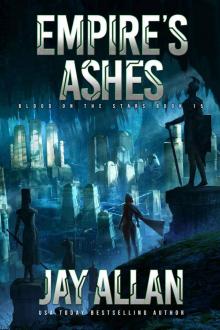 Empire's Ashes (Blood on the Stars Book 15)
Empire's Ashes (Blood on the Stars Book 15) Wings of Pegasus
Wings of Pegasus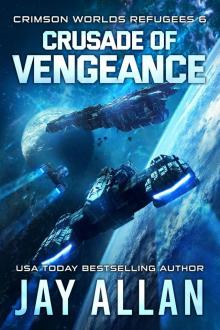 Crusade of Vengeance
Crusade of Vengeance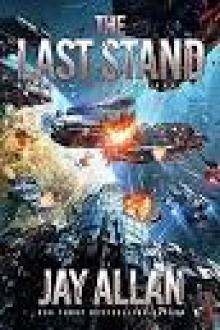 The Last Stand
The Last Stand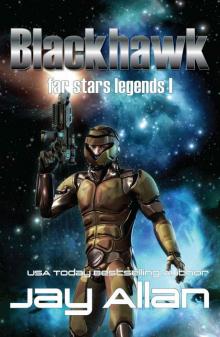 Blackhawk: Far Stars Legends I
Blackhawk: Far Stars Legends I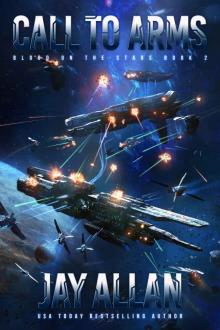 Call to Arms: Blood on the Stars II
Call to Arms: Blood on the Stars II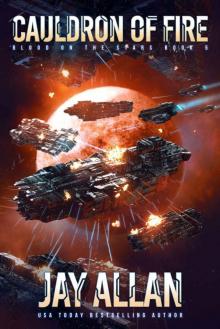 Cauldron of Fire (Blood on the Stars Book 5)
Cauldron of Fire (Blood on the Stars Book 5)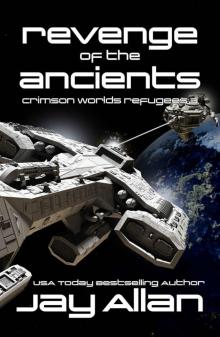 Revenge of the Ancients: Crimson Worlds Refugees III
Revenge of the Ancients: Crimson Worlds Refugees III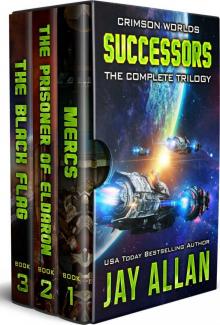 Crimson Worlds Successors: The Complete Trilogy
Crimson Worlds Successors: The Complete Trilogy The Grand Alliance
The Grand Alliance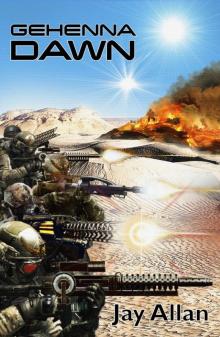 Portal Wars 1: Gehenna Dawn
Portal Wars 1: Gehenna Dawn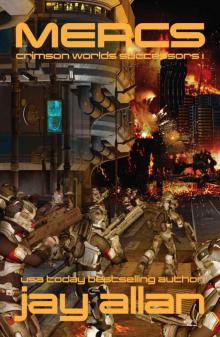 MERCS: Crimson Worlds Successors
MERCS: Crimson Worlds Successors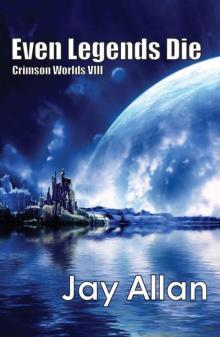 Crimson Worlds: 08 - Even Legends Die
Crimson Worlds: 08 - Even Legends Die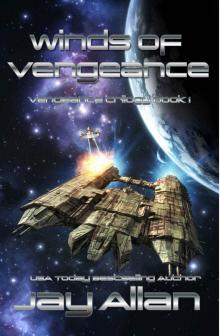 Winds of Vengeance
Winds of Vengeance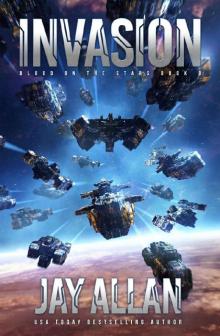 Invasion (Blood on the Stars Book 9)
Invasion (Blood on the Stars Book 9) A Little Rebellion (Crimson Worlds III)
A Little Rebellion (Crimson Worlds III)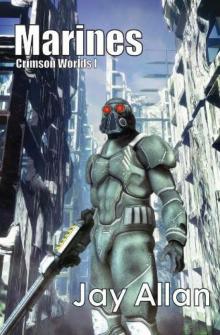 Marines
Marines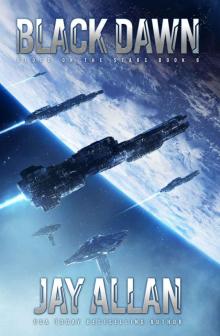 Black Dawn (Blood on the Stars Book 8)
Black Dawn (Blood on the Stars Book 8)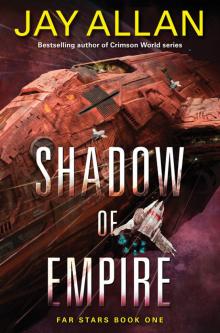 Shadow of Empire
Shadow of Empire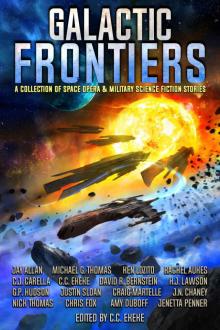 Galactic Frontiers: A Collection of Space Opera and Military Science Fiction Stories
Galactic Frontiers: A Collection of Space Opera and Military Science Fiction Stories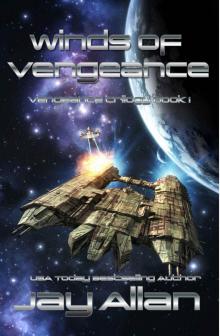 Winds of Vengeance (Crimson Worlds Refugees Book 4)
Winds of Vengeance (Crimson Worlds Refugees Book 4)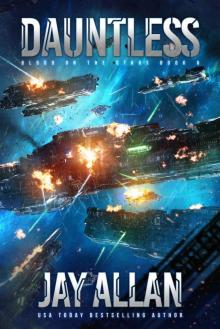 Dauntless (Blood on the Stars Book 6)
Dauntless (Blood on the Stars Book 6) Portal Wars: The Trilogy
Portal Wars: The Trilogy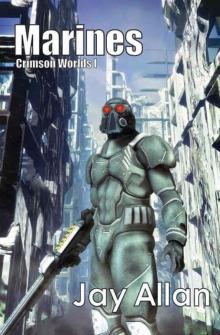 Marines cw-1
Marines cw-1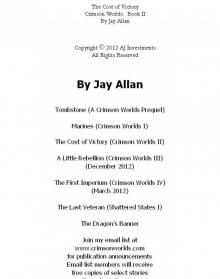 The Cost of Victory
The Cost of Victory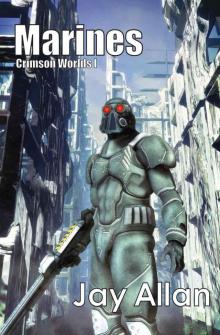 Marines (Crimson Worlds)
Marines (Crimson Worlds)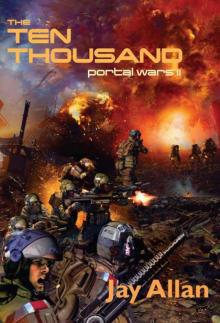 The Ten Thousand: Portal Wars II
The Ten Thousand: Portal Wars II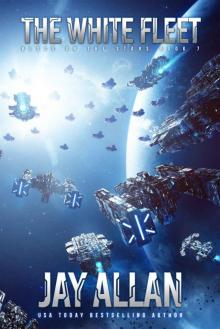 The White Fleet (Blood on the Stars Book 7)
The White Fleet (Blood on the Stars Book 7)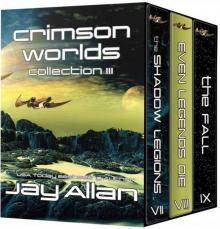 Crimson Worlds Collection III
Crimson Worlds Collection III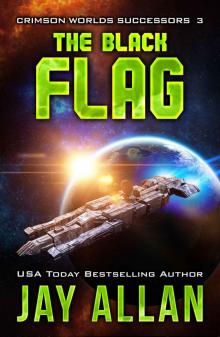 The Black Flag (Crimson Worlds Successors Book 3)
The Black Flag (Crimson Worlds Successors Book 3) Tombstone
Tombstone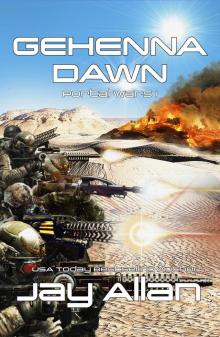 Gehenna Dawn
Gehenna Dawn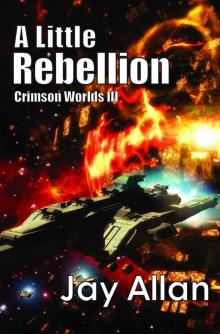 A Little Rebellion (Crimson Worlds)
A Little Rebellion (Crimson Worlds)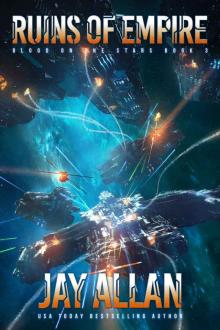 Ruins of Empire: Blood on the Stars III
Ruins of Empire: Blood on the Stars III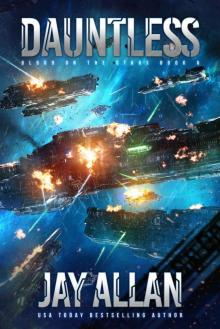 Dauntless
Dauntless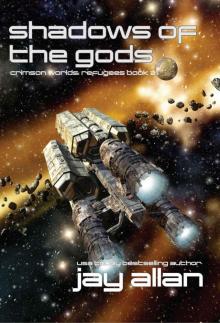 Shadows of the Gods: Crimson Worlds Refugees II
Shadows of the Gods: Crimson Worlds Refugees II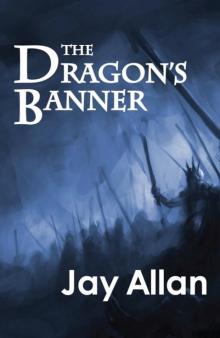 The Dragon's Banner
The Dragon's Banner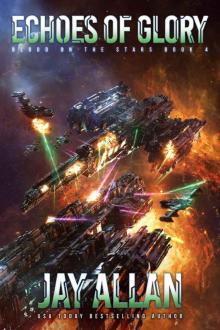 Echoes of Glory (Blood on the Stars Book 4)
Echoes of Glory (Blood on the Stars Book 4)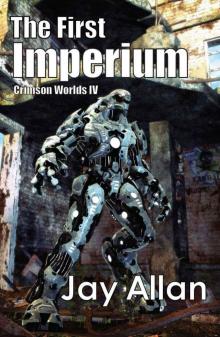 Crimson Worlds: 04 - The First Imperium
Crimson Worlds: 04 - The First Imperium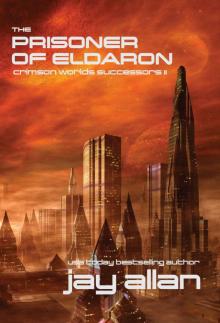 The Prisoner of Eldaron: Crimson Worlds Successors II
The Prisoner of Eldaron: Crimson Worlds Successors II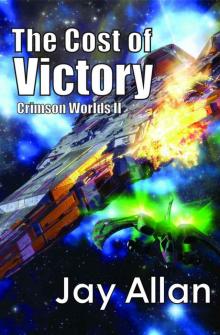 The Cost of Victory (Crimson Worlds)
The Cost of Victory (Crimson Worlds)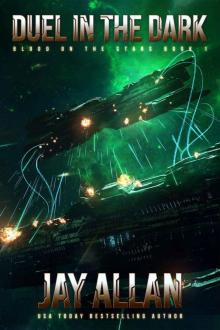 Duel in the Dark: Blood on the Stars I
Duel in the Dark: Blood on the Stars I Into the Darkness: Crimson Worlds Refugees I
Into the Darkness: Crimson Worlds Refugees I Crimson Worlds Refugees: The First Trilogy
Crimson Worlds Refugees: The First Trilogy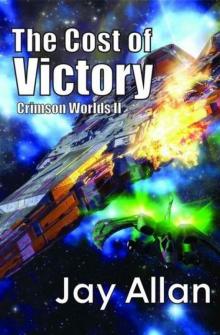 The Cost of Victory cw-2
The Cost of Victory cw-2 Stars & Empire 2: 10 More Galactic Tales (Stars & Empire Box Set Collection)
Stars & Empire 2: 10 More Galactic Tales (Stars & Empire Box Set Collection) Flames of Rebellion
Flames of Rebellion Stars & Empire: 10 Galactic Tales
Stars & Empire: 10 Galactic Tales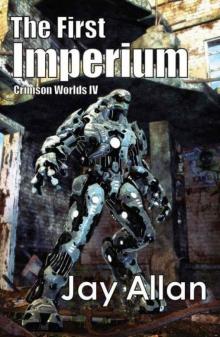 The First Imperium cw-4
The First Imperium cw-4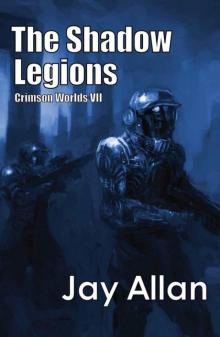 Crimson Worlds: 07 - The Shadow Legions
Crimson Worlds: 07 - The Shadow Legions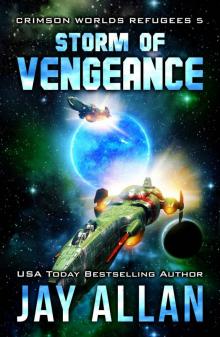 Storm of Vengeance
Storm of Vengeance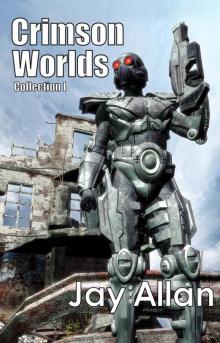 Crimson Worlds Collection I
Crimson Worlds Collection I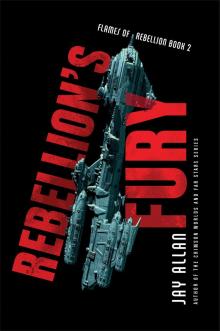 Rebellion's Fury
Rebellion's Fury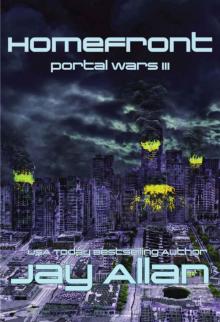 Homefront: Portal Wars III
Homefront: Portal Wars III Tombstone (crimson worlds)
Tombstone (crimson worlds)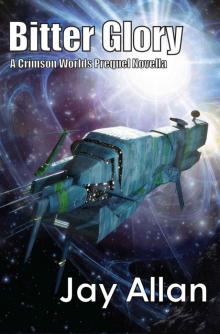 Crimson Worlds: Prequel - Bitter Glory
Crimson Worlds: Prequel - Bitter Glory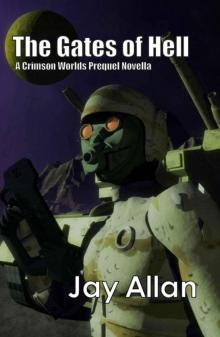 Crimson Worlds: Prequel - The Gates of Hell
Crimson Worlds: Prequel - The Gates of Hell The Fall: Crimson Worlds IX
The Fall: Crimson Worlds IX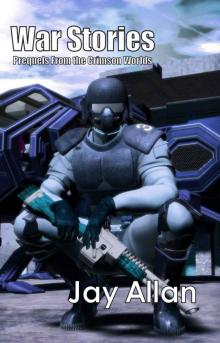 Crimson Worlds: War Stories: 3 Crimson Worlds Prequel Novellas
Crimson Worlds: War Stories: 3 Crimson Worlds Prequel Novellas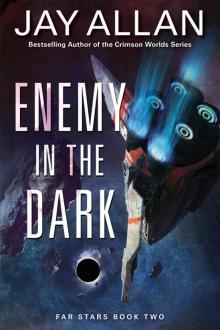 Enemy in the Dark
Enemy in the Dark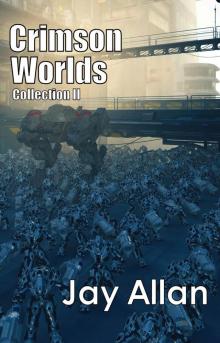 Crimson Worlds Collection II
Crimson Worlds Collection II